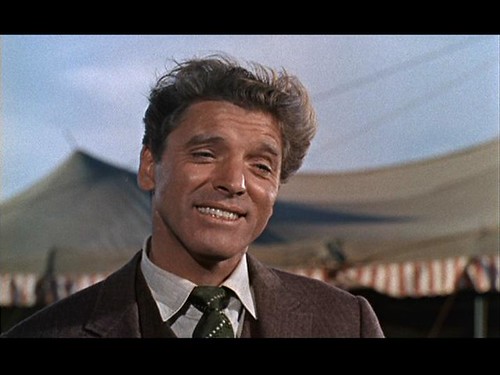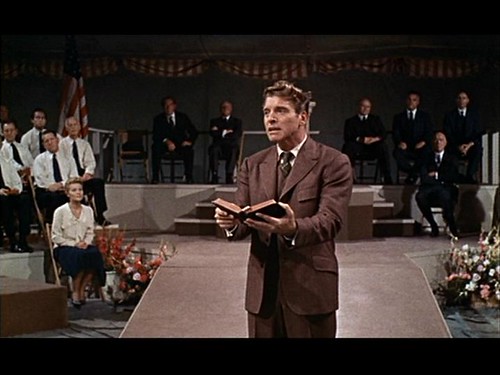← Back to Reviews
in
2. Elmer Gantry (Richard Brooks, 1960)

Sinclair Lewis' novel Elmer Gantry is basically an exposÚ of the corruption in the 1920s Midwest of religious charaltans who prey on their victims at revivals. Lewis mentored writer-director Richard Brooks (Cat on a Hot Tin Roof, The Professionals, In Cold Blood) and hoped that he would adapt his novel to the screen, and that's what happened. However, Brooks took something which was satirical, yet painted in a more black & white pallete and turned it into something more complex, where people's motivations and behaviors are much more open to interpretation. I'll say straight up that some people will have a tough time watching Elmer Gantry. It confronts people's core beliefs about God, Christianity, corruption in high places, what makes a person "good", personal responsibility, etc., and it does it very melodramatically. However, if you pay close attention, Elmer Gantry is probably the most subtle melodrama ever made because I don't believe anybody can clearly tell me which characters, if any, are truly good or evil.

The film's opening scene has Gantry (the overpowering, Oscar-winning Burt Lancaster), a drunken, womanizing traveling salesman, drinking it up on Christmas Eve with the boys in a speakeasy, but when a woman comes in asking for donations, Gantry remains in his salesman persona while pitching Jesus as someone who deserves respect and alms because he "would have made the best little All-American quarterback in the history of football". Gantry seems like a scumbag, and in many ways, he is, but as the film progresses, it becomes apparent that he has a strong spiritual yearning and truly believes in God. Sure, he screwed up at the seminary, seducing the deacon's daughter, Lulu Baines (Shirley Jones, another Oscar), thus turning her into a hooker, but that was many years ago.
Gantry gets out of town on Christmas on a freight train, and his first stop is an all-Black church, where his soulful rendition of a gospel song sends everyone into spiritual heights. It's after that when he meets Sister Sharon (Jean Simmons, in her best performance), the sincere preacher of a traveling revival. Sister Sharon is petite but full of the Spirit, and not only does she move her attendees, she turns Elmer Gantry on in more ways than one. He finagles his way past Sharon's honest business manager Bill (Dean Jagger) and is able to get a job with her revival. He proceeds to preach fire and brimstone under the revival tent but enrages Bill and gains the unwanted attention of the agnostic, Pulitzer-Prize-winning journalist, Jim Lefferts (Arthur Kennedy), who is following Sister Sharon and reporting for his big city newspaper.

Eventually, numerous crises arise, and relationships are strengthened and shattered. The thing I love about Elmer Gantry is that it paints an even-handed side to the story and its characters. I honestly believe that this film has the best script of any movie I've seen. By that, I mean that it's non-stop, straightahead storytelling, combined with sparkling dialogue and characters who seem to grow by the second. The acting is uniformly awesome. I just wish I could find some decent shots of Arthur Kennedy and Dean Jagger or maybe an audio link of Gantry (yeah, it's really Lancaster) singing "On My Way".

The above is a weak one with Kennedy where Lancaster tells him that Jagger wants to give him some "secret information". Gantry sure has a way with people. He often seems and is sincere. Now, my question is, how many people are or know Elmer Gantrys, at least this one in the film? How many have friends or family who seem and oftentimes are, completely sincere, yet "backslide" constantly? Do you still love them or do you cut them loose? Or does anybody else, besides me, see Elmer Gantry when they look in the mirror? (I'm not a womanizer though; I left that to somebody else in the family.)

Sinclair Lewis' novel Elmer Gantry is basically an exposÚ of the corruption in the 1920s Midwest of religious charaltans who prey on their victims at revivals. Lewis mentored writer-director Richard Brooks (Cat on a Hot Tin Roof, The Professionals, In Cold Blood) and hoped that he would adapt his novel to the screen, and that's what happened. However, Brooks took something which was satirical, yet painted in a more black & white pallete and turned it into something more complex, where people's motivations and behaviors are much more open to interpretation. I'll say straight up that some people will have a tough time watching Elmer Gantry. It confronts people's core beliefs about God, Christianity, corruption in high places, what makes a person "good", personal responsibility, etc., and it does it very melodramatically. However, if you pay close attention, Elmer Gantry is probably the most subtle melodrama ever made because I don't believe anybody can clearly tell me which characters, if any, are truly good or evil.

The film's opening scene has Gantry (the overpowering, Oscar-winning Burt Lancaster), a drunken, womanizing traveling salesman, drinking it up on Christmas Eve with the boys in a speakeasy, but when a woman comes in asking for donations, Gantry remains in his salesman persona while pitching Jesus as someone who deserves respect and alms because he "would have made the best little All-American quarterback in the history of football". Gantry seems like a scumbag, and in many ways, he is, but as the film progresses, it becomes apparent that he has a strong spiritual yearning and truly believes in God. Sure, he screwed up at the seminary, seducing the deacon's daughter, Lulu Baines (Shirley Jones, another Oscar), thus turning her into a hooker, but that was many years ago.
Gantry gets out of town on Christmas on a freight train, and his first stop is an all-Black church, where his soulful rendition of a gospel song sends everyone into spiritual heights. It's after that when he meets Sister Sharon (Jean Simmons, in her best performance), the sincere preacher of a traveling revival. Sister Sharon is petite but full of the Spirit, and not only does she move her attendees, she turns Elmer Gantry on in more ways than one. He finagles his way past Sharon's honest business manager Bill (Dean Jagger) and is able to get a job with her revival. He proceeds to preach fire and brimstone under the revival tent but enrages Bill and gains the unwanted attention of the agnostic, Pulitzer-Prize-winning journalist, Jim Lefferts (Arthur Kennedy), who is following Sister Sharon and reporting for his big city newspaper.

Eventually, numerous crises arise, and relationships are strengthened and shattered. The thing I love about Elmer Gantry is that it paints an even-handed side to the story and its characters. I honestly believe that this film has the best script of any movie I've seen. By that, I mean that it's non-stop, straightahead storytelling, combined with sparkling dialogue and characters who seem to grow by the second. The acting is uniformly awesome. I just wish I could find some decent shots of Arthur Kennedy and Dean Jagger or maybe an audio link of Gantry (yeah, it's really Lancaster) singing "On My Way".

The above is a weak one with Kennedy where Lancaster tells him that Jagger wants to give him some "secret information". Gantry sure has a way with people. He often seems and is sincere. Now, my question is, how many people are or know Elmer Gantrys, at least this one in the film? How many have friends or family who seem and oftentimes are, completely sincere, yet "backslide" constantly? Do you still love them or do you cut them loose? Or does anybody else, besides me, see Elmer Gantry when they look in the mirror? (I'm not a womanizer though; I left that to somebody else in the family.)
